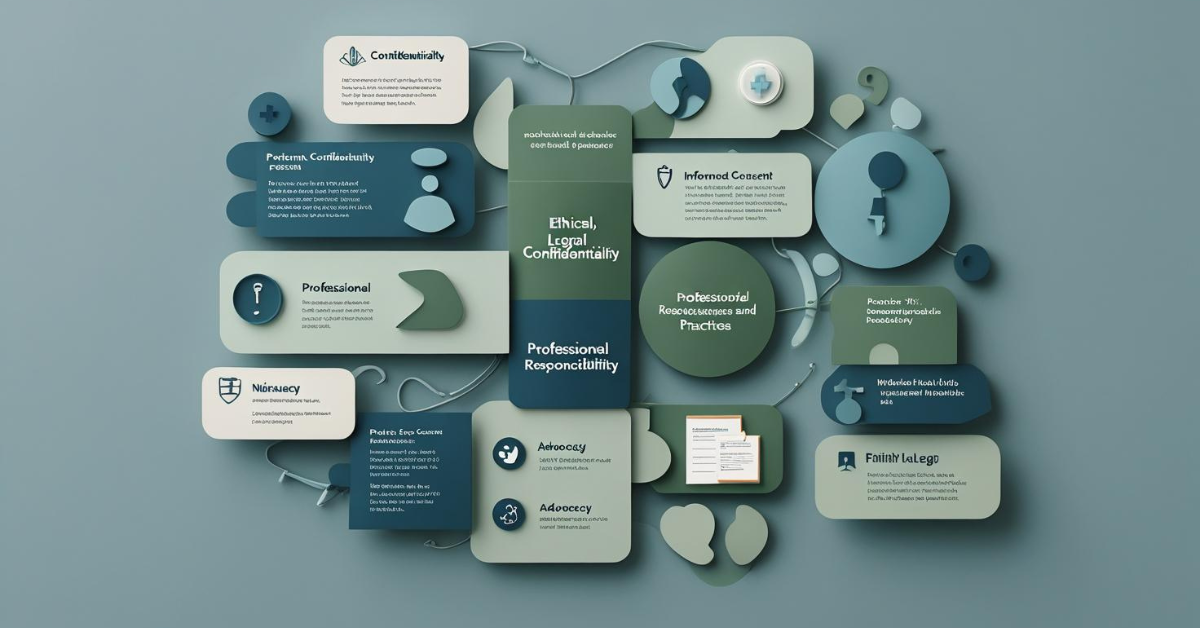The Ethical Legal and Moral Aspects In Nursing Practices. Ethical, legal, and moral considerations are fundamental to nursing practice and guide nursing staff in providing safe, competent, and compassionate care. These considerations ensure patient well-being, safeguard professional standards, and maintain public confidence in the nursing profession.
What are Ethical Legal and Moral Aspects In Nursing Practices
Ethical, legal, and moral considerations are fundamental to nursing practice and guide nursing staff toward safe, competent, and compassionate care. Nursing staff must adhere to ethical principles such as autonomy, beneficence, and non-maleficence, while understanding and complying with legal requirements and professional boundaries.
Ethical Aspects
Ethical Principles
Nurses operate within a framework of ethical principles, which include:
Autonomy: Respecting the patient’s right to make their own decisions about their medical care.
Beneficence: Acting in the patient’s best interest and promoting their well-being.
Non-maleficence: Avoiding harm to patients.
Justice: Ensuring a fair and equitable distribution of resources and care.
Fidelity: Loyalty and trust toward patients.
Truthfulness: Sincerity and honesty with patients.
Ethical Dilemmas
Nurses frequently face situations in which ethical principles conflict and require careful consideration and decision-making. Professional Boundaries:
Maintaining appropriate boundaries in the nurse-patient relationship is critical to avoid exploitation or violations of care.
Legal Aspects
Laws and Regulations
Nurses must be aware of and comply with relevant laws and regulations, including those relating to patient rights, consent, confidentiality, and scope of practice.
Professional Responsibilities
Nurses are responsible for their actions and inactions and may face legal consequences for negligence or malpractice.
Informed Consent
It is a legal and ethical requirement to ensure that patients understand the risks, benefits, and alternatives to medical procedures before giving their consent.
Reporting Obligations
Nurses have a legal and ethical responsibility to report certain incidents, such as suspected abuse or neglect, and unsafe practices.
Moral Aspects
Moral Obligations: Nursing staff have a moral obligation to provide compassionate, respectful, and culturally sensitive care to all patients.
Moral Distress: Nursing staff may experience moral distress when they are unable to provide the care they believe is necessary due to various limitations.
Advocacy: Nursing staff act as advocates for patients, ensuring that their rights are protected and their voices are heard within the healthcare system.
Ethical and Legal Aspects
Nursing care is undoubtedly intimate because interactions with patients are very intimate and occur at a time when patients are in a very vulnerable state. In turn, the career of nursing comes with myriad ethical and legal considerations. Establishing nurturing relationships with patients and their families is an important goal of nursing, as is delivering care without prejudice and while respecting human needs and values.
Nurses are ethically and legally accountable for their own actions and for the actions of those to whom they delegate care. All nurses must practice nursing in accordance with professional codes of ethics and recognized standards of professional practice. Nurse leaders and managers are responsible and accountable for ensuring that staff members maintain competence, provide safe and ethical care, and practice within legal and regulatory boundaries.
In today’s complex health-care system, ethical and legal issues very often become entwined. In this topic, nurse leaders and managers learn the ethical and legal aspects of nursing practice, including their essential roles in developing, maintaining, and/or monitoring standards, licensure, and regulation of professional nursing practice to ensure safe care and quality outcomes.
Additionally, the elements and categories of malpractice along with common ethical and legal issues nurse leaders and managers may face are presented. Knowledge, skills, and attitudes related to the following core competencies are included in this topic: patient-centered care; teamwork and collaboration; quality improvement; informatics; and safety.
Ethical Aspects of Nursing Practice
Respect for the individual is the ethical underpinning of nursing practice, and most nurses use a combination of ethical morals, values, principles, theories, codes, and laws to guide practice (Murray, 2003). Ethical nursing practice necessitates applying moral beliefs and making logical, consistent decisions (Burkhardt & Nathaniel, 2008).
Ethics in nursing requires “the examination of all kinds of ethical and bioethical issues from the perspective of nursing theory and practice, which, in turn, rest on the agreed core concepts of nursing, namely: person, culture, care, health, healing, environment, and nursing itself” (Johnstone, 2009, p. 16). By applying ethics, nurses can determine the best course of action in specific situations. Ethics is an integral part of nursing practice and involves respect and advocacy for patients and families in all settings (American Association of Colleges of Nursing [AACN], 2008).
Morals
The terms morals and ethics are often, incorrectly, used interchangeably. Morals are defined as “conduct, character, and motives involved in moral acts and include the notion of approval or disapproval of a given conduct, character, or motive that we describe by such words as good, desirable, right, worthy, or conversely bad, undesirable, wrong, evil, unworthy” (Davis, Fowler, & Aroskar, 2010, p. 1).
Morals are ingrained in one’s consciousness, provide people with established rules of conduct based on societal customs and habits, and reflect what is right or wrong and good or bad. In comparison, ethics reflects what actions people should take in a specific situation based on their own morals. Both morals and ethics are influenced by personal life experiences and value systems. Nurses must maintain moral integrity and fulfill their moral obligation to patients, regardless of the setting.
Moral Integrity
Moral integrity refers to quality of character and involves acting consistently with personal and professional values (Butts & Rich, 2013). Nurses with moral integrity are honest and trustworthy, consistently do the right thing, and stand up for what is right despite the consequences (Laabs, 2011). In addition, nurses with moral integrity have a sense of self-worth because they have clearly defined values that are congruent with their actions (Epstein & Delgado, 2010).
Moral integrity is a positive attribute for nurses in leadership and management positions and is critical to ethical decision making. Nurse leaders and managers with moral integrity own their own beliefs and values, respect the beliefs and values of others, and, despite possible differences, avoid compromising their own moral integrity. When a nurse behaves in a way that is not congruent with professional moral beliefs, moral integrity is in jeopardy.
Moral Obligation
An obligation is a duty to or responsibility for another human being. Nurses enter a relationship of trust with a patient that involves a moral obligation or duty to provide care in a nondiscriminatory manner. A nurse’s primary commitment is to the recipient of care (American Nurses Association [ANA], 2015a). Once a nurse-patient relationship has begun, a nurse has a duty to the patient and cannot abandon a patient in need of care (ANA, 2006).
At times, nurses are challenged to balance professional obligations and personal risks. Although nurses have a moral obligation to care for patients at all times, situations may arise in which nurses could face potential personal harm. Therefore, nurses must be able to critically think and analyze certain situations in which the risk may outweigh the moral obligation to care for a patient. In such cases, it is a nurse’s decision to accept personal risk that exceeds the limits of his or her moral obligation. The ANA asserts that nurses are morally obligated to care for patients when the following four criteria are present (ANA, 2006, p. 3):
- The patient is at significant risk of harm, loss, or damage if the nurse does not assist.
- The nurse’s intervention or care is directly relevant to preventing harm.
- The nurse’s care will probably prevent harm, loss, or damage to the patient.
- The benefit the patient will gain outweighs any harm the nurse may incur and does not present more than an acceptable risk to the nurse.
If one or more of these criteria are absent, the nurse must evaluate the situation and choose whether or not to care for the patient as his or her moral obligation (ANA, 2006). However, once a nurse accepts an assignment, he or she must fulfill the assignment or risk being charged with abandonment (Guido, 2010).
Read More:
https://nurseseducator.com/didactic-and-dialectic-teaching-rationale-for-team-based-learning/
https://nurseseducator.com/high-fidelity-simulation-use-in-nursing-education/
First NCLEX Exam Center In Pakistan From Lahore (Mall of Lahore) to the Global Nursing
Categories of Journals: W, X, Y and Z Category Journal In Nursing Education
AI in Healthcare Content Creation: A Double-Edged Sword and Scary
Social Links:
https://www.facebook.com/nurseseducator/
https://www.instagram.com/nurseseducator/
https://www.pinterest.com/NursesEducator/
https://www.linkedin.com/in/nurseseducator/
https://www.researchgate.net/profile/Afza-Lal-Din
https://scholar.google.com/citations?hl=en&user=F0XY9vQAAAAJ



A further issue is that video gaming has become one of the all-time most important forms of fun for people of all ages. Kids play video games, and adults do, too. The particular XBox 360 is among the favorite games systems for many who love to have a huge variety of activities available to them, and also who like to learn live with some others all over the world. Thanks for sharing your thinking.
TONY20251204test. Những điểm ấn tượng chỉ có tại nhà cái 888slots
TONY20251204test. Những điểm ấn tượng chỉ có tại nhà cái 888slots
Glad I detected this on google .